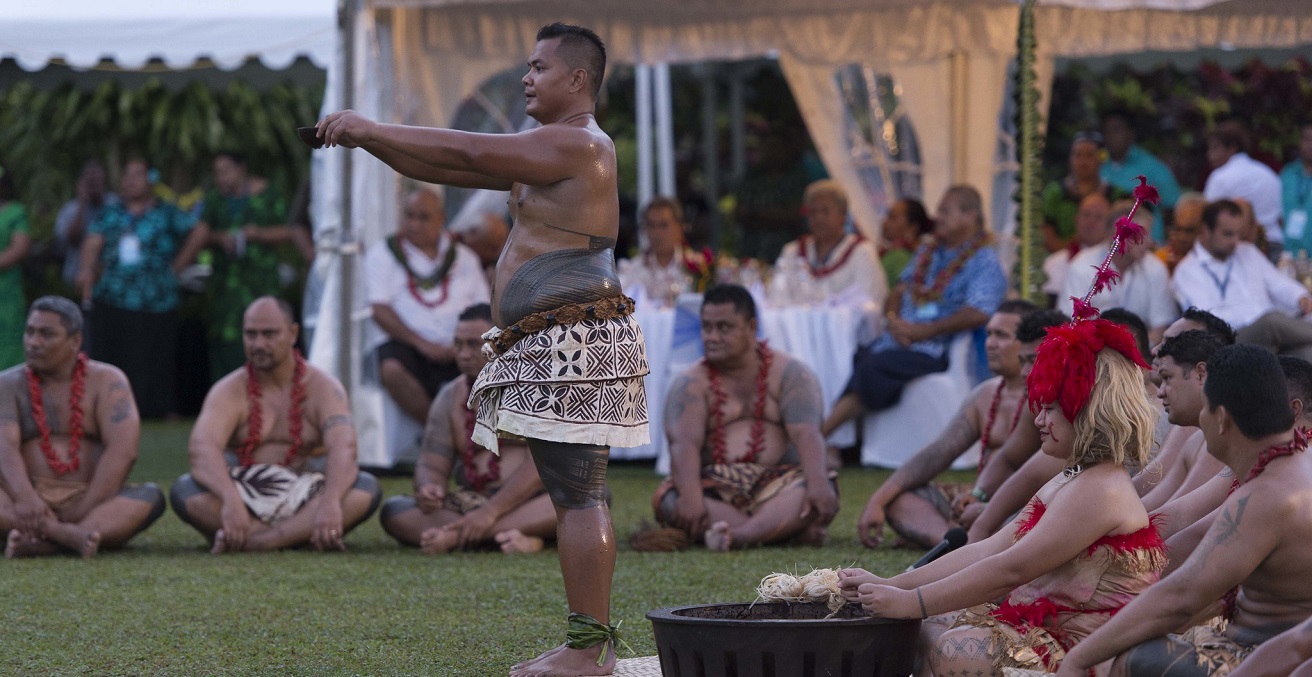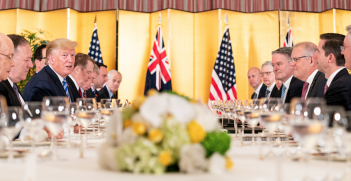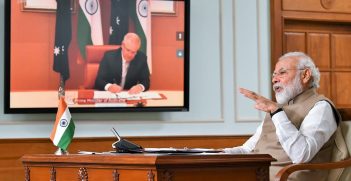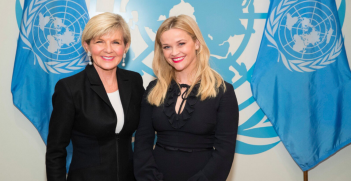The 2020 Defence Strategic Update and Australia's Commitments in the Indo-Pacific

The challenges presented by COVID-19 will have vast and unprecedented effects on the Indo-Pacific region. The Morrison government must act on its commitment to supporting development in the region by reinforcing existing aid policies and leveraging Australia’s status in regional multilateral organisations.
Australia’s foreign policy objectives for the last decade and beyond have focused on promoting a peaceful and transparent geopolitical region. In light of unprecedented economic, political, and social challenges caused by COVID-19, Australia’s foreign policy can be used to guide regional recovery, while strengthening regional institutions and partnerships along the way.
Prime Minister Scott Morrison’s October 2019 Lowy Lecture painted a descriptive picture of a world in transition. Not six months before the coronavirus pandemic dislocated societies and economies, Morrison’s speech heightened consciousness of the forces of global disruption, forecasting growing risks to globalisation and further polarisation within and between societies.
With a priority on the primacy of sovereign states, the prime minister reinforced Australia’s need to adhere to and support a rules-based global order. Within a framework of globalisation that is “facilitating, aligning and engaging,” Morrison emphasised that Australian foreign policy should continue to contribute positively to peace and stability in the region.
Globalism must engage
With COVID-19 further disrupting and polarising Australia’s region, now is the time for Australia to give substance to these principles. In particular, it is essential that Australia harness this opportunity to engage more purposefully with our pacific neighbours, and the Asia-Pacific region more broadly. In the last decade, Australia has demonstrated a renewed loyalty to its Pacific neighbours through policy initiatives such as the Pacific Step-Up. However, Australia should ensure that its policy responses still reach other middle-power allies in the region. For example, Australia should also engage with North Asian states such as Japan and South Korea to better understand their anticipated recovery from various regional challenges caused by COVID-19.
Australia could also focus on engaging with fellow G20 members across the region, to plan for economic initiatives leveraged through G20 forums. There is no doubt that decreased capital flows across the immediate region will affect the international economy and the economies of the G20 countries more broadly. Increased international pressures willing for a more active G20 in steering the international economic recovery could be addressed by engaging middle-powers in the region. This also sets a precedent, increasing the cohesiveness of economic and political negotiations in the region, while strengthening regional partnerships.
Globalism must facilitate
In the Lowy Lecture, Morrison reinforced Australia’s capacity to facilitate positive and practical globalism in the region and Australia’s determination to become more active in setting global standards for commerce and investment. In order for Australia to strengthen free and open regional trade, it is essential to revisit Australia’s Pacific engagement strategy with consideration of the new challenges posed by COVID-19. It is clear that Australia’s Pacific family will face numerous challenges on the road to economic recovery from COVID-19.
The economies of Pacific Island nations are suffering, as travel restrictions and social distancing requirements reduce the ease of trade. This is compounded by severe reductions in the availability of trade goods. Pacific workers, who usually travel to Australia for work and return remittances to their families, are being affected by border closures and restrictions. The IMF predicts that globally, the repatriation of guest workers will lead to an estimated 20 percent reduction in national remittances in 2020. In the Pacific, these remittances make up large percentages of national GDPs. For example, 15 percent of the GDP of Samoa is made up by remittances from overseas workers. A recent publication released by the IMF shows figures estimated by the Wold Economic Outlook Database supporting the inference that in 20202, public debt in Pacific Island nations is set to rise due to COVID-19. This will decrease the GDP of some of the most vulnerable Pacific states. Declining labour mobility will also contribute to shortfalls of labour and trade demands in Australia.
Australia is not unaware of these challenges. The “Partnerships for Recovery” framework is a good starting point for diagnosing the economic and social challenges facing the region. This framework, released by the Department of Foreign Affairs and Trade in June 2020, outlines Australia’s policy responses to shape a regional COVID-19 recovery. The policy demonstrates Australia’s willingness to engage and strengthen relationships with regional partners, with a view to collective recovery. The policy readily identifies the need to reduce public debt by engaging international finance institutions for Pacific Island nations’ recovery. However, the government should live up to its promise of “immediate assistance” by bolstering the policy. The government should immediately facilitate the exchange of Pacific workers along the “Australia-Pacific Corridor,” akin to policies that have been implemented to facilitate small numbers of international students to travel to Australia to study in isolated areas.
While the framework provides a high-level assessment, Australia must remain astute to unfolding challenges as they arise. Governance mechanisms must be employed to ensure the framework is fit for the purpose of assisting states to recover as quickly as possible. Australia should also utilise the Pacific Islands Forum and focus on reformulating tangible policy objectives to address these new and diverse challenges. These can be incorporated into the Framework for Pacific Regionalism to guide future initiatives and engagement.
Globalism must align
In the Lowy Lecture, Morrison implied that globalism is facilitated positively when states align their strategic foreign policy objectives but remain loyal to their sovereign interests. These sentiments are reflected broadly in Australian foreign policy. The 2020 Defence Strategic Update reinforces the necessity for Australia to align its strategic interests with the interests of the Indo-Pacific region. The foreword of the strategy points directly to Australia’s commitment to strengthen regional engagement with the Indo-Pacific, highlighting that the region remains “the centre of strategic competition,” “contested,” and “apprehensive.”
It is clear that the region is facing dynamic power shifts. These shifts call for mature, consistent, and aligned foreign policy responses across the region. Developing Australia’s military capabilities, while also strengthening the institutional capacity of weaker states in the region, will help balance more dominant powers. Australia should promote regional institutional support and dialogues to ensure that its strategic planning for the future is met with strong regional consensus on social and political issues. Regional forums such the Asia-Pacific Economic Cooperation or the Regional Comprehensive Economic Partnership are perfect organisations to leverage these dialogues.
Lastly, Australia must strengthen its focus on mitigating humanitarian and social risks to the region. States must harness strong consensus on social issues to ensure that regional responses remain aligned and cooperative in times of crisis. Policies should focus on the ability of states to withstand economic shocks in times of limited or constrained trade liberalisation. These considerations are increasingly necessary in the context of growing climate, economic, and trade tensions that threaten the region.
Harnessing engagement in the ways outlined above will allow Australia to substantively lead, innovate, and create new global standards for crisis-recovery. Supporting states recovery from COVID-19 will ensure that current challenges do not undermine sustained efforts to promote an integrated and peaceful region.
Lara Scott has a Bachelors Degree in Law and International Relations (LLB:BA) and is currently undertaking her Graduate Diploma of Legal Practice in Perth, Western Australia. Lara participated in a six-month internship with the United Nations Development Programme in Timor-Leste in 2018 and maintains a keen interest in international development and public policy. See Lara’s previous Australian Outlook publication “Facing Forward – Timor Leste’s Youth.”
This article is published under a Creative Commons License and can be republished with attribution.





